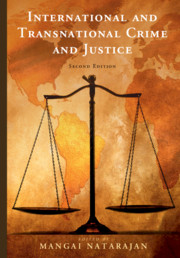Book contents
- International and Transnational Crime and Justice
- International and Transnational Crime and Justice
- Copyright page
- Contents
- Figures and Tables
- Preface
- About the Editor
- Notes on Contributors
- Introduction
- PART I OVERVIEW: TRANSNATIONAL CRIME
- PART IA Varieties of Transnational Crimes
- 1 Drug Trafficking
- 2 Understanding the Complexity of Trafficking in Human Beings
- 3 The Trafficking of Children in the USA
- 4 Migrant Smuggling
- 5 International Trafficking of Stolen Vehicles
- 6 Transnational Firearms Trafficking Guns for Crime and Conflict
- 7 Trafficking Antiquities
- 8 The Illegal Cigarette Trade
- 9 Wildlife Trafficking The Problem, Patterns, and a Promising Path Toward Prevention
- 10 Cybercrime
- 11 Crime and Online Anonymous Markets
- 12 Cryptocurrencies and Money Laundering Opportunities
- 13 Money Laundering
- 14 International Fraud
- 15 Ransom Kidnapping A Global Concern
- 16 Child Pornography
- 17 Transnational Environmental Crime
- 18 Multinational Corporate Criminal Negligence A Case Study of the Bhopal Disaster, India
- 19 Maritime Crimes An Overview
- 20 Worldwide Maritime Piracy and the Implications for Situational Crime Prevention
- 21 Poaching of Terrestrial Wild Animals and Plants
- 22 Illegal Commercial Fishing
- 23 Corruption
- 24 Tourist and Visitor Crime
- 25 Terrorism
- 26 Political Assassinations A Global Perspective
- PART IB Transnational Organized Crime
- PART IC Factors that Facilitate Transnational Crimes
- PART ID Transnational Justice Matters
- PART II OVERVIEW: INTERNATIONAL CRIME
- PART III OVERVIEW: INTERNATIONAL AND TRANSNATIONAL CRIME RESEARCH
- World Map
- Index
- References
15 - Ransom Kidnapping A Global Concern
from PART IA - Varieties of Transnational Crimes
Published online by Cambridge University Press: 20 June 2019
- International and Transnational Crime and Justice
- International and Transnational Crime and Justice
- Copyright page
- Contents
- Figures and Tables
- Preface
- About the Editor
- Notes on Contributors
- Introduction
- PART I OVERVIEW: TRANSNATIONAL CRIME
- PART IA Varieties of Transnational Crimes
- 1 Drug Trafficking
- 2 Understanding the Complexity of Trafficking in Human Beings
- 3 The Trafficking of Children in the USA
- 4 Migrant Smuggling
- 5 International Trafficking of Stolen Vehicles
- 6 Transnational Firearms Trafficking Guns for Crime and Conflict
- 7 Trafficking Antiquities
- 8 The Illegal Cigarette Trade
- 9 Wildlife Trafficking The Problem, Patterns, and a Promising Path Toward Prevention
- 10 Cybercrime
- 11 Crime and Online Anonymous Markets
- 12 Cryptocurrencies and Money Laundering Opportunities
- 13 Money Laundering
- 14 International Fraud
- 15 Ransom Kidnapping A Global Concern
- 16 Child Pornography
- 17 Transnational Environmental Crime
- 18 Multinational Corporate Criminal Negligence A Case Study of the Bhopal Disaster, India
- 19 Maritime Crimes An Overview
- 20 Worldwide Maritime Piracy and the Implications for Situational Crime Prevention
- 21 Poaching of Terrestrial Wild Animals and Plants
- 22 Illegal Commercial Fishing
- 23 Corruption
- 24 Tourist and Visitor Crime
- 25 Terrorism
- 26 Political Assassinations A Global Perspective
- PART IB Transnational Organized Crime
- PART IC Factors that Facilitate Transnational Crimes
- PART ID Transnational Justice Matters
- PART II OVERVIEW: INTERNATIONAL CRIME
- PART III OVERVIEW: INTERNATIONAL AND TRANSNATIONAL CRIME RESEARCH
- World Map
- Index
- References
- Type
- Chapter
- Information
- International and Transnational Crime and Justice , pp. 92 - 97Publisher: Cambridge University PressPrint publication year: 2019
References
REFERENCES
- 2
- Cited by



